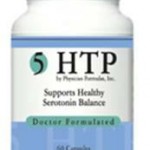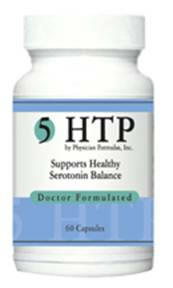5-Hydroxytryptophan (5-HTP), also known as oxitriptan (INN), is a naturally occurring amino acid and chemical precursor as well as metabolic intermediate in the biosynthesis of the neurotransmitters serotonin and melatonin from tryptophan. Tryptophan is an amino acid that converts to 5 HTP (5-hydroxytryptophan) which then can convert to serotonin, an important brain chemical involved in mood, behavior, appetite, and sleep. Low serotonin levels may lead to addictive behavior such as gambling or other habits caused by weak will power. Serotonin is known as 5-HT, or 5-hydroxytryptamine, and is found in many places in the body particularly the brain, gastrointestinal system, and blood cells. Once serotonin is made, the pineal gland is able to convert it at night into melatonin, the sleep-inducing hormone. Tryptophan, 5 HTP, and melatonin are available for sale as dietary supplements, but not serotonin.
 Some people are deficient in serotonin and hence a supplement, such as 5 HTP, that increases levels may be helpful to them for depression or other conditions. Other people may have depression, anxiety, and other symptoms that may appear to be due to serotonin deficiency, but may actually be from other causes — whether an imbalance in brain chemicals, hormones, a high amount of inflammatory substances in the brain and body, abnormal neural connections, etc. There’s really no easy way — for instance blood studies in a doctor’s office — to tell whether someone is deficient in serotonin, and if they are, whether a 5HTP supplement would help treat their depression or other health problems.
Some people are deficient in serotonin and hence a supplement, such as 5 HTP, that increases levels may be helpful to them for depression or other conditions. Other people may have depression, anxiety, and other symptoms that may appear to be due to serotonin deficiency, but may actually be from other causes — whether an imbalance in brain chemicals, hormones, a high amount of inflammatory substances in the brain and body, abnormal neural connections, etc. There’s really no easy way — for instance blood studies in a doctor’s office — to tell whether someone is deficient in serotonin, and if they are, whether a 5HTP supplement would help treat their depression or other health problems.
5-HTP is sold over-the-counter in the United Kingdom, United States and Canada as a dietary supplement for use as an antidepressant, appetite suppressant, and sleep aid, and is also marketed in many European countries for the indication of major depression under trade names like Cincofarm, Levothym, Levotonine, Oxyfan, Telesol, Tript-OH, and Triptum. Several double-blind placebo-controlled clinical trials have demonstrated the effectiveness of 5-HTP in the treatment of depression, though a lack of high quality studies has been noted.
5-HTP in supplement form is typically sold in 50Â mg or 100Â mg gelatin or vegetarian capsules. It is usually sourced from the seeds of Griffonia simplicifolia. 5-HTP has been studied and shown to be of benefit in the following conditions:
- primary fibromyalgia syndrome
- Friedreich’s ataxia
- depression,
- anxiety,
- binge eating associated with obesity, and
- insomnia.
There is no statistically significant difference between 5-HTP and placebo in treating chronic headaches (primary or otherwise).
A 2001 meta-analysis found that of 108 studies on 5-HTP published between 1966 and 2000, only two met the authors’ quality standards for inclusion. The two studies that were deemed of sufficient quality did not deal with 5-HTP exclusively, instead combining results for 5-HTP and tryptophan, so the results may not be completely applicable for 5-HTP alone. While the combined analysis of the two 5-HTP and tryptophan studies showed significant effectiveness over placebo in treating depression, the authors state that overall “the evidence was of insufficient quality to be conclusive”. They also state that “because alternative antidepressants exist which have been proven to be effective and safe, the clinical usefulness of 5-HTP and tryptophan is limited at present”.
Possible risks or side effects
 Because 5-HTP has not been thoroughly studied in a clinical setting, possible side effects and interactions with other drugs are not well known.
Because 5-HTP has not been thoroughly studied in a clinical setting, possible side effects and interactions with other drugs are not well known.
Administered serotonin has been shown to increase the risk of heart valve disease in animals.5-HTP has not been subjected to this test. Oral 5-HTP results in an increase in urinary 5-HIAA, a serotonin metabolite, indicating that 5-HTP is peripherally metabolized to serotonin, which is then metabolized. This might cause a false positive test in tests looking for carcinoid syndrome.
5-HTP can cause hypertension by increasing plasma renin activity, when not co-administered with a peripheral aromatic L-amino acid decarboxylase inhibitor, such as carbidopa or benserazide.
Direct and indirect evidence for possible yet unproven risks and side effects associated with 5-HTP when overdosed:
- Heart valve damage or disease (cardiac fibrosis).
- When combined with MAOIs or SSRIs, 5-HTP can cause acute serotonin syndrome.
- When combined with carbidopa (as a treatment for symptoms of Parkinson’s disease), 5-HTP causes nausea and vomiting; however this can be alleviated via administration of granisetron. As mentioned above under pharmacology, cases of scleroderma-like illness have been reported in patients using carbidopa and 5-HTP.
It has been suggested that 5-HTP may cause eosinophilia-myalgia syndrome (EMS), a serious condition which results in extreme muscle tenderness, myalgia, and blood abnormalities. However, there is evidence to show that EMS is caused by a contaminant.
Do not use 5-HTP is you are currently taking any of the following medications:
Anti-depressant drugs; Monoamine oxidase inhibitors; Selective Serotonin Reuptake Inhibitors; Tricyclic medications; Weight Loss medications; Anti-parkinson medications; Barbiturates and other tranquilizing drugs; Antihistamines and cold medications; Alcoholic beverages; Intravenous drugs; Cancer chemotherapy or antibiotic medications.
Warning:
Dosages of 5-hydroxy L-tryptophan (5-HTP) greater than 100 milligrams per day should be taken only under the guidance of a physician. 5-HTP can increase the effect of tranquilizing drugs and can impair the ability to drive an automobile.

